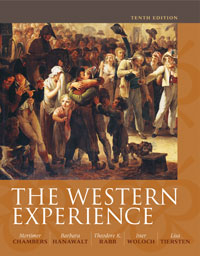| |
Answer choices for questions
1
through
8 | | A) | Name given to the coalition including Germany, Austria-Hungary, Turkey (the Ottoman Empire), and Bulgaria in World War I.
| | B) | In the new time of total war during World War I, civilians—mostly women and men ineligible for military duty—remaining at home assumed a primary role in the national economy; their continued efforts were held up as indispensable to the war being fought on the military front.
| | C) | Article 231 of the Treaty of Versailles, specifying that Germany alone was responsible for causing the First World War.
| | D) | International organization created in the wake of the end of World War I and located in Geneva; the forerunner to the modern-day United Nations.
| | E) | In World War I, the German military plan specifying how the army would fight a two-front war: Germany would invade Belgium and the Netherlands on its way to France, score a quick defeat in the west, and then concentrate its forces against Russia in the east.
| | F) | Name of the members of the Triple Entente of 1907—Britain, France, and Russia—which expanded during World War I to include Belgium, Serbia, Greece, Italy, Romania, the Soviet Union, and the United States.
| | G) | Unprecedented type of warfare in which all segments of society, civilians and soldiers, men and women, were mobilized in the hope of ensuring victory.
| | H) | Designation for the former colonial possessions of Germany and the Ottoman Empire, which the League of Nations placed under the control of the various Allied nations after World War I.
|
|
|





